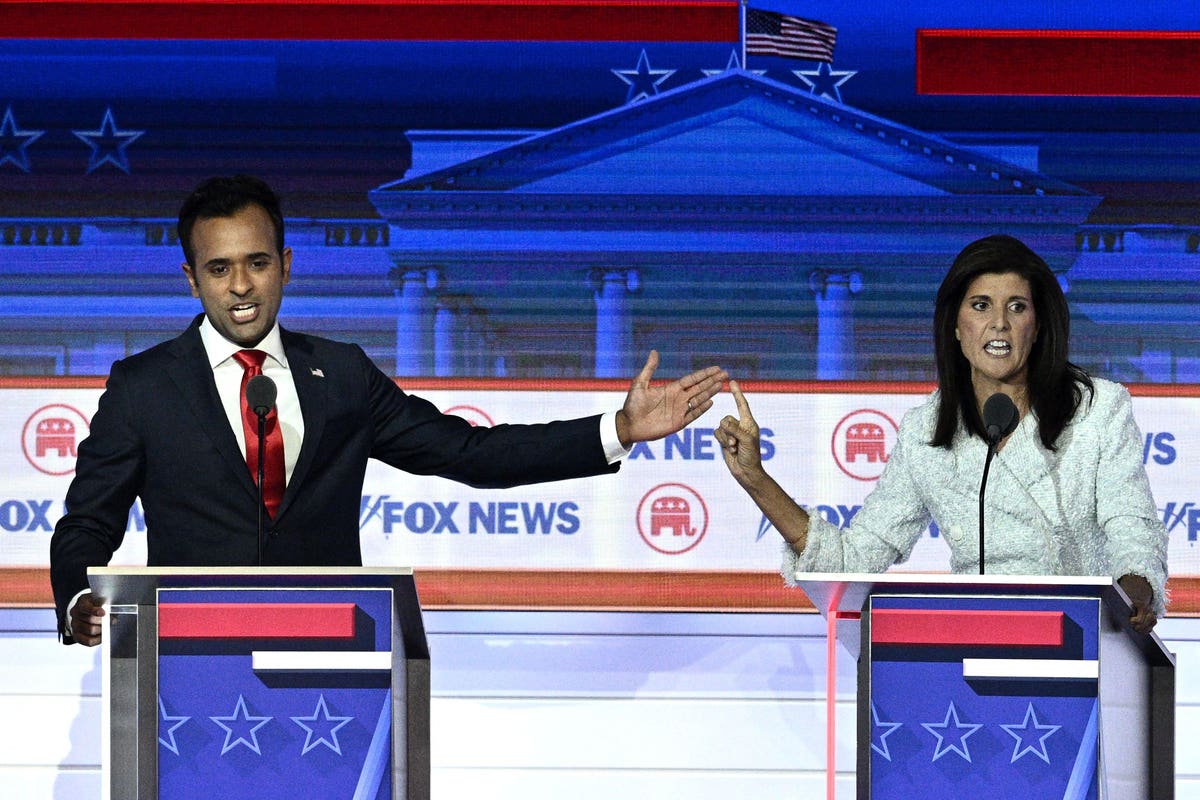On the Republican presidential primary debate stage Wednesday night, former South Carolina Gov. Nikki Haley created moments of camaraderie with women viewers, whether intentionally or not, as she stood in light blue among a sea of dark suits. In addition, while little of what she said was new, much of what she chose to emphasize aligns with messaging meant to appeal to a class of more moderate women voters who are unlikely to support Republican frontrunner Donald Trump.
Time will tell if that’s a winning strategy, especially among a highly mobilized MAGA
MAGA
Less than 30 minutes into Wednesday’s debate, Haley distinguished herself from her sparring male counterparts, stating, “This is exactly why Margaret Thatcher said if you want something said ask a man, if you want something done ask a woman.” Haley’s quip builds on perceptions – and evidence – that women leaders, moreso than men, are motivated by achievement over ego. No matter their party, profession, or generation, this statement likely elicited a collective head nod among many women viewers.
Later, when Haley took Vivek Ramaswamy to task for his lack of foreign policy experience, the frustration visible on her face and in her voice is one with which many women can relate. In that moment, Ramaswamy was the inexperienced and overconfident man trying to railroad a former UN Ambassador on issues of foreign policy and national security. Haley, expectantly, held her own and proved her unwillingness to back down to mediocre men. Real-time dials from Navigation Research showed this was an especially good moment for Haley, with independent and independent-leaning women increasing their support for her throughout the exchange. Men dialed up as well, indicating something else that matters for Haley’s gender strategy; despite research showing some differences in how voters respond to women’s expression of anger, her assertiveness did not—at least among some viewers —elicit a backlash.
These moments of potential camaraderie with women viewers are rooted in shared lived experiences of navigating male-dominated spaces, something that no other candidate on the debate stage can claim. Camaraderie among women, however, does not win elections. The progressive women watching last night’s debate might praise Haley’s performance but are still fundamentally opposed to her positions on most issues.
But there is potential for Haley to draw on this shared experience and identity among Republican or right-leaning independent women with whom she is more ideologically aligned and who might be looking for an alternative to Trump. While few would characterize Haley as moderate, she positioned herself among the less extreme contenders in the first Republican primary debate. From the jump, she criticized Republicans for spending and called for real talk and accountability. On abortion, she called for consensus and pragmatism while upholding her staunch pro-life position. And while she raised her hand to say that she would back Trump as the party’s nominee even if he was criminally convicted, she also used that opportunity to remind viewers that “Trump is the most disliked politician in all of America,” a truth especially resonant with women voters who have left the Republican Party in recent years.
A telling moment came when Fox host Martha MacCallum quoted Haley’s oft-repeated line that allowing transgender girls in sports is the “women’s issue of our time.” When given the platform to double down on the anti-trans position that she has used to appeal to the especially conservative GOP base, Haley chose instead to emphasize her broader positions on parental choice in education. She concluded with a more cliché statement of girl power (“strong girls become strong women. Strong women become strong leaders”), only offering one line reflective of the exclusionary and transphobic rhetoric more common in her stump speech (“biological boys don’t belong in locker rooms”). That line caused a drop in real-time dials of independent and independent-leaning debate viewers, men and women, for Haley, consistent with a recent USA Today/Suffolk University poll showing that nearly two-thirds of independent women consider LGBTQ+ rights as important to their 2024 presidential vote. If Haley is trying to position herself as the most electable in November 2024 by leveraging appeal to independent women voters, shifting emphasis away from anti-trans rhetoric might be one approach.
But first Haley needs to win over Republican primary voters. And, since 2016, those voters have shown little desire for level-headedness or moderation, consensus, or women’s solidarity. So while Haley’s debate performance has won praise, it’s unclear if the Republican primary electorate will be ready to send this “tough-as-nails woman to the White House.”
Read the full article here





